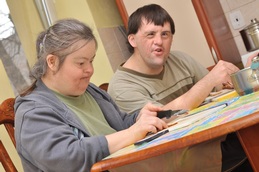Disabled people living in deprived areas of Scotland disproportionally high

A significantly high number of people with learning disabilities live in the most deprived areas of Scotland, statistics from the 2013 Learning Disability Statistics Scotland (LDSS) dataset have revealed this week.
The least deprived areas of Scotland have proportionally far fewer people with a learning disability living in these areas than the national average.
Information on employment, further education, what people do during the day, housing arrangements and who people with learning disabilities live with have all been detailed in the release.
The statistics, released on behalf of the Scottish government, are the first time the deprivation profiles of adults with learning disabilities known to local authorities have been publically released.
Claire Stuart, the Scottish Consortium for Learning Disability’s (SCLD) learning disabilities statistics project manager, said: “For the first time the 2013 data collection allows us to undertake deprivation provision mapping of the areas where adults with learning disabilities known to local authorities live in Scotland.”
“When considered alongside the other information collected, the inclusion of deprivation data allows for breadth and depth of analysis which has not previously been available.”
Adults with learning disabilities from the least deprived have been found to be more likely to live with family carers compared to those living in more deprived parts of Scotland.
The figures have been created to inform Scottish national policy and influence the service provided for adults with learning disabilities throughout Scotland.
Scottish Government’s ‘the keys to life’ strategy replaced its own 2000 policy ‘the same as you?’ in 2013, causing the data collection measuring its success to be renamed from ‘electronic Same As You’ (eSAY) to the ‘Learning Disability Statistics Scotland’ (LDSS).
The keys to life strategy sets out the Scottish Government’s 52 new recommendations to be followed by local authorities and NHS Scotland to improve the lives of adults with learning disabilities in Scotland.
Latest News
 29-Jul-24
Dementia Bus gives carehome.co.uk staff insight into life with dementia
29-Jul-24
Dementia Bus gives carehome.co.uk staff insight into life with dementia
 27-Jul-23
UK's top home care agencies in 2023 revealed
27-Jul-23
UK's top home care agencies in 2023 revealed
 30-Nov-22
A quarter of older people keep their falls secret from family
30-Nov-22
A quarter of older people keep their falls secret from family
 29-Nov-22
'Covid-19 has not gone away' say terminally ill
29-Nov-22
'Covid-19 has not gone away' say terminally ill
 28-Nov-22
IT consultant who received poor care opens 'compassionate' home care business
28-Nov-22
IT consultant who received poor care opens 'compassionate' home care business